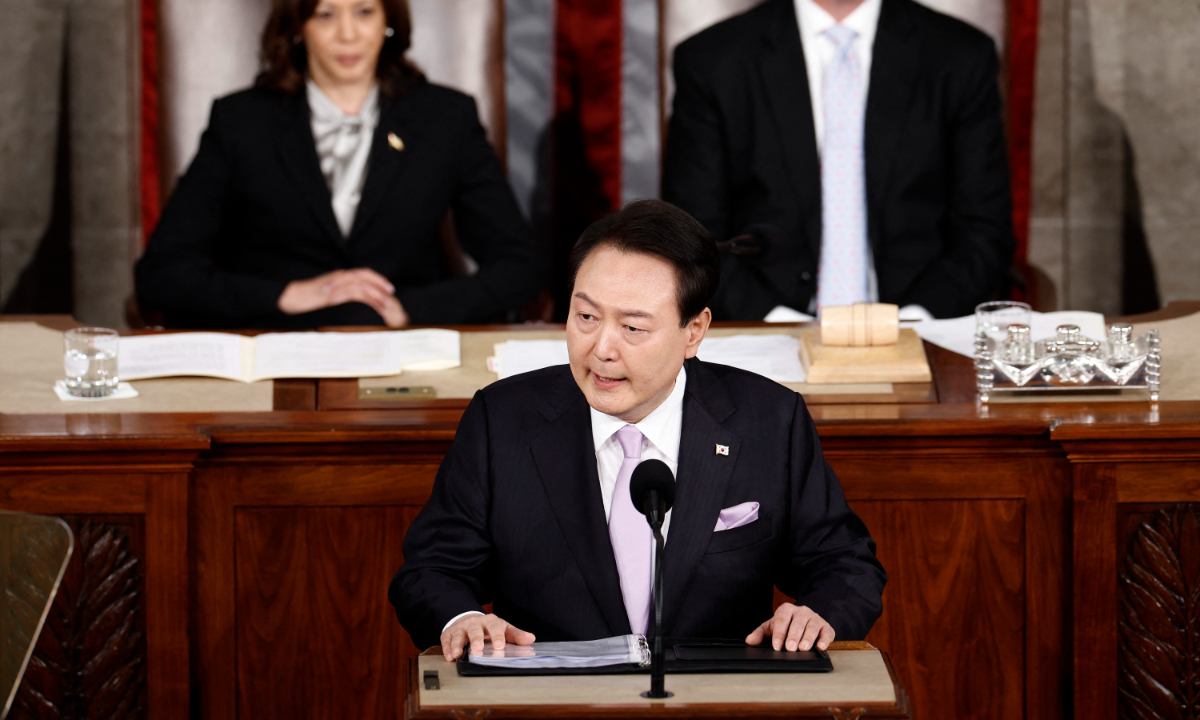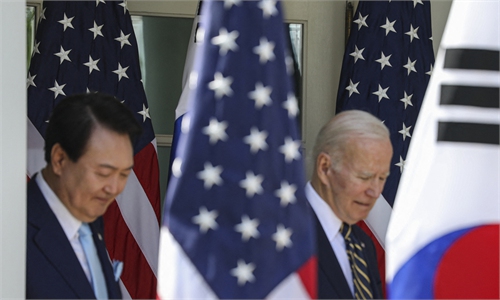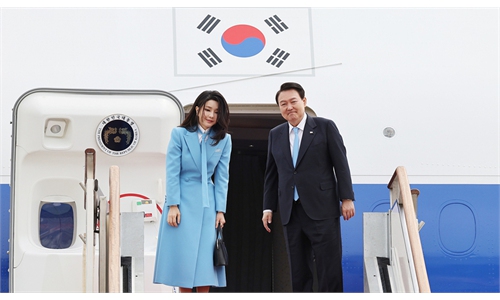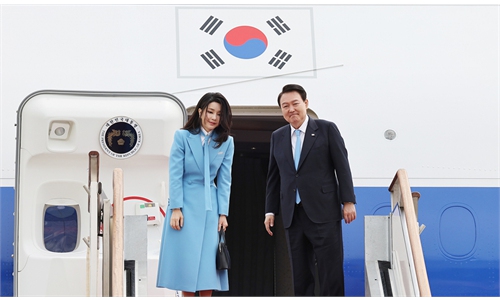Yoon’s overwhelming pro-US policy could become nightmare for S.Korea, with losses to outweigh gains, experts say

Photo:AFP
South Korean President Yoon Suk-yeol's overwhelming pro-US policy, including South Korea's new nuclear deterrence agreement with the US that could allow Washington to dispatch a nuclear ballistic missile submarine to South Korea, has drawn strong criticism from its neighboring countries China, Russia and North Korea, with analysts saying Yoon's increasingly extreme foreign policy has "lost balance" and will likely see losses outweigh gains.
During a discussion held at Harvard Kennedy School on Friday, Yoon said that the new nuclear deterrence agreement that he reached with the US should be understood as an "upgraded" version of the allies' 1953 Mutual Defense Treaty, according to the Yonhap News on Saturday.
Under the Washington Declaration Yoon adopted with US President Joe Biden on Wednesday, the two countries agreed to "share information on nuclear and strategic operations and planning," and regularly deploy US strategic assets to South Korea, to enhance the credibility of the US "extended deterrence." Extended deterrence refers to the US approach of mobilizing all of its military capabilities, including nuclear, to "defend" South Korea.
Chinese experts said deploying US nuclear weapons on the Korea Peninsula is an extremely dangerous and provocative act toward China, Russia and North Korea. And that Washington and Seoul will face strategic level retaliation which could spark another nuclear crisis in the region.
Kim Yo-jong, vice department director of the Central Committee of the Workers' Party of Korea, said in a statement that published on the North Korean state media Korean Central News Agency on Saturday that Yoon's visit to Washington "was an occasion for us to have much clearer understanding about the root-cause and physical entity disturbing peace and security of the Korean Peninsula and the region."
The formation of Washington-Seoul "Nuclear Consultative Group," the regular and continuous deployment of US nuclear strategic assets on the peninsula, combined with frequent military exercises "made the regional politico-military situation unable to be extricated from the currents of instability. This provides us with an environment in which we are compelled to take more decisive action in order to deal with the new security environment," Kim said.
Song Zhongping, a Chinese military expert and TV commentator, told the Global Times on Saturday that the US "extended deterrence" strategy is not for defending its ally South Korea but an approach to use North Korea's military development as a pretext to deploy US strategic assets, including nuclear weapons, to impose more strategic pressures to China, Russia and North Korea.
"This will do nothing good for the denuclearization of the peninsula but to make the situation worse and also seriously threaten the security of China, Russia and North Korea. After the Ukraine crisis in Europe, the US is likely to use the Korean Peninsula nuclear issue to provoke another crisis in Asia, but China and Russia will not allow the US to do so," Song noted.
Yoon's foreign policy was criticized by a South Korean opposition leader as humiliating on Friday.
Lee Jae-myung, chairman of the main opposition Democratic Party said Yoon's performance at his meeting with Biden ended up in a humiliating situation of generously spreading "global hogang" diplomacy. Hogang, a buzzword in Korean, refers to a customer who is easy to deceive.Lee also criticized Yoon for his improper positions on the Ukraine crisis and the Taiwan question, according to the Xinhua News Agency.
China and Russia also criticized the US-South Korea agreement. Russian Foreign Ministry Spokeswoman Maria Zakharova said in a statement published on Friday that "We saw the reports about the agreement between the US and the Republic of Korea on joint planning with respect to the use of nuclear weapons. This turn of events is clearly destabilizing in nature and will have serious negative consequences for regional security projecting onto global stability."
Russia also responded to Yoon's comment about considering supply arms to Ukraine. Kremlin spokesman Dmitry Peskov said any decision by South Korea to supply arms to Ukraine would make Seoul a participant in the conflict, Reuters reported on April 19.
On Thursday, Chinese Foreign Ministry spokesperson Mao Ning said the US puts its own geopolitical interests before the security of the whole region, when asked to comment on the Washington Declaration.
"The US has been a source of tension through exploiting the issues on the Korean Peninsula. The US behavior is a result of its Cold War mentality. What the US has done stokes bloc confrontation, undermines the nuclear non-proliferation system and hurts the strategic interest of other countries. It has also increased tensions on the peninsula and jeopardized regional peace and stability. This is the very opposite of the goal to denuclearize the peninsula and we are firmly against this," said Mao.
According to the Chinese Foreign Ministry on April 23, Chinese Vice Foreign Minister Sun Weidong made solemn representations to South Korean Ambassador to China Chung Jae-ho over Yoon's wrong remarks on the Taiwan question.
If Seoul ignores warnings from China, Russia and North Korea and completely executes US order for "extended deterrence" in the region, South Korea will likely face retaliation from China, Russia and North Korea, said experts.
This will cause serious damage to South Korea's security and development, because Yoon is making his country appear more hostile to its three important neighbors, analysts said. China and Russia are also key trade partners for South Korea.
This could become a "nightmare" for Yoon and his country, and the protection and investment provided by the US are not worth the loss that South Korea will suffer in terms of both economy and security, experts said.
Jin Canrong, associate dean of the School of International Studies at the Renmin University of China, told the Global Times on Saturday that Yoon's decision-making on foreign policy has been deeply affected by the pro-US advisors, and that his policy has lost balance and become increasingly extreme, but "this kind of unwise policy is unsustainable, because it is against the national interests of South Korea."




